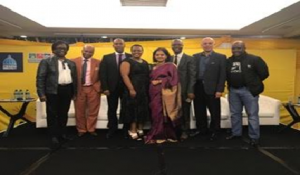MF Leader, Mrs. S. T. Rajbansi with attendees at the Social Cohesion Conversation at the ICC on Tuesday, 25 April 2017
In her introductory address, Mrs. S. T. Rajbansi, leader of the Minority Front mentioned that, “currently our economy and various buzzwords requires focus so as South Africans we have Social Cohesion and Transformation in Chapter 15 of the NDP 2030 to fall back on”. She reiterated that any gaps identified can be dealt with at a legislative and policy level.
On Radical Economic Transformation (RET), Mrs. Rajbansi stated that she is looking forward to hearing more as the Hon. Minister. Gigaba told the International Monetary Fund that RET meant inclusive growth. She emphasised that Social Cohesion is about inclusivity so that “no one is left behind” and that the SDGs now link to the NDP 2030 in view of us missing the MDGs 2015.
She highlighted the following hindrances to Blacks and Indians working together as:
-
Cultural differences and commonalities requires more research, aside from Havard studies, more of our own research must be conducted;
-
There are low levels of trust;
-
Laws and Policies are contrary to the spirit enshrined in the Constitution, eg. Affirmative Action;
-
Language is a barrier to relations;
-
Weak networking/working in silos and weak databases on SMMEs (SMMEs workshop in Ethekweni);
-
Reviewing terminologies on how we classify people, or sound politically correct, tolerance, and why not embrace people?
-
Addressing workplace racism, with reference to recent court rulings which outlaw it;
-
The media vilifying race groups;
-
The types of newer business entities seem daunting but needs tackling, eg. PPPs, co-operatives and joint ventures. There must be a move away from traditional ones;
-
The HDI, Innovative and Freedom indexes are low; and
-
The ongoing triple challenges of poverty, unemployment and inequality.
In attempting to level the playfields, Mrs. Rajbansi suggested the following initiatives be introduced:
-
Formation of think tanks in the different sectors by publishing magazines and blogs to disseminate knowledge. She cited an excerpt from Stieglitz’s lecture on “Creating a learning Society” where the risks associated with pursuing certain economic freedoms were considered that is, the potential risks associated with a modern capitalist system based on individual empowerment and incentives.
This promotes collective empowerment with the aim of this conversation stressing a sharing framework with productivity and growth, eg. businesses sharing knowledge and both grow. Individuals are only about competitive advantage of one company over another.
-
Crafting business models to incorporate the pillars of the NDP of strong leadership, effective government, active citizenry, capabilities, opportunities and conditions.
-
Ensuring municipal research has a compilation on SMMEs and a corporate database for flow of information and networking.
-
Building of capabilities by the Local Government SETA.
-
Opening opportunities by implementing legislation correctly and monitoring, eg. Affirmative Action.
-
Regular evaluation to correct growth path to meet the NDP 2030 goals which is 12½ years away.
-
Business coaching in cultural diversity management to use commonalities effectively.
-
Role strengthening of state banks like Ithala, State Bank of India and other public funders like NEF.



You must be logged in to post a comment.